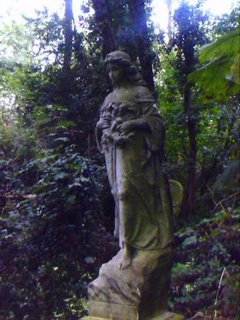Today, I learned about Count Eric Von Stenbock, "Scholar, connoisseur, drunkard, poet, pervert, most charming of men," as WB Yeats called him. He was also remembered with affection by Aubrey Beardsley, Symons and Lionel Johnson (although they thought his poetry was drivel). Many of his verses concerned his doomed love for a Berkshire youth, Charles Bertram Fowler, who died of consumption at the age of 16.
He was alcoholic, Catholic, Buddhist, homosexual and overall degenerate, and most interestingly of all, he lived in Withdean. Mental illness dogged him throughout his Thirties, but, since he was a Count, when escorted (as he was at all times) by a dog, a monkey and a life-size doll, everybody had to greet them with according courtesy.
At the time of his death, his uncle and heir, far away in Esbia, saw an apparition of his tear-stained face at his study window.
Oh Eric, I applaud you. There's nothing quite like being a rotten poet with a taste for life-size dolls and the Divine.
I love Brighton cemetery. It's been far too long since I was last amongst the tangled ivy, my trainers squishing in the mud. Angels rear up at every turn, the lettering on headstones turning to rust in the dew.
Today, I peered into the small, simple plot where the Sisters of Mercy (nuns, not goth band) lay crammed in, heads to tiny feet. I also saw (thanks again to my knowledgeable friend) the resting place of the first man ever to spot Antarctica.
Tonight, I am very happy in my polka dot dressing gown and leopard skin slippers, listening to Debussy and generally avoiding starting my new story about a man who is perpetually late for everything. Mmm.
There's nothing like the dead to raise the spirits!

